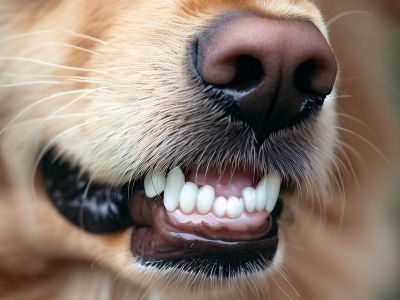If you are the owner of a dog, you might be tempted to provide some of your medications to it if it appears to be in pain. But, if your medicine contains naproxen, this might be a very risky mistake.
Humans frequently use naproxen, a nonsteroidal anti-inflammatory medicine (NSAID), to treat a variety of ailments include fever, inflammation, and discomfort.

But what about our furry friends? Even at little dosages, naproxen can cause harmful and perhaps deadly adverse effects in dogs.
In this blog post, we will explain what naproxen poisoning in dogs is, what causes it, what symptoms to look out for, and how to treat it.
By the end of this article, you will have a better understanding of naproxen poisoning in dogs and how to protect your furry friend from this hazard.
Contents
What is Naproxen and Why is it Dangerous for Dogs?
Naproxen is a type of medication that belongs to the group of nonsteroidal anti-inflammatory drugs (NSAIDs).
It is commonly used by humans to reduce fever, pain, and inflammation. However, Both ingestion and topical use of naproxen to dogs’ skin can be extremely dangerous.
Serious health issues including ulceration, bleeding, and organ failure can result from naproxen intoxication in dogs.

How Does Naproxen Poisoning in Dogs Occur
Dogs can be exposed to naproxen in different ways. The most common way is by ingesting naproxen pills or liquid that are left within their reach or given to them by mistake.
Some people may also apply naproxen gel or cream to their dogs’ skin to treat wounds or inflammation, not knowing that it can be absorbed into the bloodstream and cause toxicity.
Additionally, If dogs consume human food containing naproxen or lick a person who has taken naproxen, they might become poisoned.
Signs of Naproxen Poisoning in Dogs
Naproxen poisoning in dogs can cause various signs and symptoms that depend on how much and what kind of naproxen the dog has consumed, and how long ago the exposure occurred.

Some of the signs and symptoms are common to other conditions, while some are more specific to naproxen toxicity.
It is important to seek veterinary attention immediately if you suspect your dog has ingested naproxen or shows any of the following signs and symptoms.[1]
Some common signs and symptoms include:
- Vomiting
- Diarrhea
- Loss of appetite
- Abdominal pain
- Lethargy
- Weakness
- Dehydration
- Pale gums
- Increased thirst and urination
- Blood in vomit or stool
- Seizures
- Collapse
- Coma
- Death
How is Naproxen Poisoning in Dogs Diagnosed and Treated?
Naproxen poisoning in dogs is diagnosed by taking a history of exposure, observing the clinical signs, performing a physical examination, and doing blood tests.
Blood tests can reveal anemia from blood loss, as well as elevated levels of BUN (blood nitrogen) and creatinine if kidney failure is present.
Contact your veterinarian or a pet poison control hotline right away if you believe your dog has been exposed to naproxen.

Treatment Options for Naproxen Poisoning in Dogs
The treatment of naproxen poisoning in dogs depends on the severity of the condition and the presence of complications.[2]
In order to control pain and inflammation, protect the stomach and intestines from bleeding and ulcers, maintain kidney and liver function, and limit additional naproxen absorption are the major objectives of therapy.
Some possible treatments include:
- Inducing vomiting or administering activated charcoal to prevent further absorption of naproxen.
- Giving intravenous fluids and electrolytes to correct dehydration and electrolyte imbalances.
- Giving medications to protect the stomach lining and reduce acid production.
- Giving medications to enhance blood clotting and prevent bleeding.
- Giving medications to support kidney function and prevent kidney failure.
- Giving medications to support liver function and prevent liver damage.
- Monitoring vital signs and blood parameters closely.
- Providing supportive care and pain relief as needed.
Tips to Prevent Naproxen Poisoning in Dogs
Naproxen poisoning in dogs can be prevented by following some simple precautions. Naproxen is a human medication that should never be given to dogs without consulting a veterinarian.[3]
Even at modest dosages, naproxen can cause harmful and sometimes deadly adverse effects in dogs.

How to Store and Dispose of Naproxen Products Safely
To prevent accidental ingestion of naproxen by dogs, it is important to store and dispose of naproxen products safely. Some tips are:
- Keep naproxen and other human medications out of reach of dogs and other pets.
- Do not give naproxen or any other human medication to your dog without consulting your veterinarian first.
- Read the label carefully and follow the instructions when giving any medication to your dog.
- Be aware of the potential side effects and interactions of any medication that your dog is taking.
- Contact your veterinarian immediately if you suspect that your dog has ingested naproxen or any other toxic substance.
FAQs
What are the symptoms of naproxen toxicity in dogs?
Naproxen toxicity in dogs can cause various symptoms that affect the gastrointestinal (GI) tract, the kidneys, and the central nervous system (CNS).
Vomiting, diarrhea, stomach discomfort, blood in the vomit or stool, mouth or gum ulcers, pale gums, lack of appetite, weight loss, lethargy, weakness, dehydration, increased thirst and urination, seizures, coma, and death are a few of the symptoms.
How much naproxen is toxic?
A single dose of 7 mg/kg can cause GI symptoms, while a dose of 13-15 mg/kg can cause kidney failure. Doses higher than 400 mg/kg can cause CNS effects and doses higher than 600 mg/kg can be fatal.
What is the half life of naproxen in dogs?
The half life of naproxen in dogs is about 74 hours. This means that it takes about 74 hours for half of the naproxen to be eliminated from the body.
Naproxen is mainly excreted in the feces and undergoes extensive enterohepatic recirculation. This accounts for the long half life and the prolonged effects of naproxen in dogs.
What is naproxen treatment for dogs?
Naproxen treatment for dogs involves supportive care and symptomatic management. The main goals of treatment are to prevent further absorption of naproxen, to protect the GI tract from ulceration and bleeding, to support the kidney and liver function, and to manage pain and inflammation.
Conclusion
In conclusion, If administered to dogs in excessive dosages or for an extended period of time, naproxen can be extremely harmful to them. It may result in severe issues with your dog’s kidneys, intestines, and stomach.
- Without first contacting a specialist, avoid attempting to treat your dog’s pain or inflammation using human drugs. For the health and wellbeing of your dog, there are safer and better alternatives.
- Naproxen can cause ulcers, bleeding, and organ failure in dogs, even at low doses.
If you suspect Naproxen poisoning in dogs, you should contact your veterinarian or an animal poison control center immediately.
We hope this article has helped you learn more about naproxen poisoning in dogs and how to protect your furry friend from this hazard.
References:
- Naproxen-induced toxicosis in a dog. (1987, December 1). PubMed. Retrieved June 30, 2023, from – NCBI
- Kicera‐Temple, K., Londoño, L., Lanaux, T. M., & Buckley, G. J. (2019). Treatment of a massive naproxen overdose with therapeutic plasma exchange in a dog. Clinical Case Reports, 7(8), 1529–1533. – Wiley Online Library
- Human Medicines Can Be Poisonous to Pets | VMBS News. (2022, March 11). VMBS News. Retrieved June 30, 2023, from – Texas A&M University

Julia is a Board Certified Veterinary Nutritionist, practicing veterinarian in a non-profit animal hospital and feline sanctuary located in Rochester, NY. She is also a full-time veterinary advisor at DogLikesBest. She focuses on writing healthcare-related topics including dog foods, treats, veterinary diets, food for specific healthcare features, etc. Moreover, any article on DogNeedsBest that has to concern feline health in any way, goes under her scrutiny before being published.


